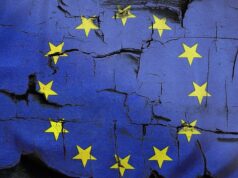
The occupation of the head office of the new EU prosecutor’s office has become a political powerhouse of poker. The reason is the favorite Laura Codruta Kövesi. She made her name in Romania as a corruption hunter – but was deposed by the government. Now Bucharest wants to prevent with all his might that Kövesi gets the EU office. Because from there it could become a danger to politics.
Corruption, money laundering, abuse of subsidies: these are spicy topics that the new EU prosecutor’s office should deal with. And these are topics with which Kövesi has plenty of experience. As head of the Romanian Anti-Corruption Authority, the 45-year-old lawyer earned a good reputation over the borders of her country. Between 2013 and 2015, it brought to justice dozens of high-ranking, partly officiating politicians and state officials, including ministers, mayors, judges, clerical workers and former Prime Minister Victor Ponta.
But in her fight against corruption, Kövesi may have stirred up too much dust: last year she was deposed by the Social Democratic and Liberal government. She was accused, among other things, of abuse of power and mismanagement. She should also have conspired with the Romanian intelligence service. The anti-corruption agency was weakened after legal dismissal after dismissal, dismissed numerous investigators from Kövesis time.
Investigations against „Romania’s highest executioner“
Kövesi himself finally became Persona non grata. The secretary-general of the social democratic government party PSD called her last „Romania’s highest executioner“. It is clear that the fact that Kövesi could take over an authority to combat the misuse of EU funds, met in Bucharest on fierce resistance. The coalition government of the PSD and the liberal ALDE has mobilized against it for weeks. Meanwhile, it is also being investigated against them. The alleged offenses: Misrepresentation, abuse of office and bribe taking. The allegations come from an ex-PSD MP who has settled in Serbia.
But while Kövesi is facing cold winds in Bucharest, she is receiving support from parts of the EU. On Thursday, the competent committee of the EU Parliament voted by a large majority to make Kövesi the first EU prosecutor. A panel of experts headed by the Austrian lawyer Ulrike Haberl-Schwarz also recommended the Romanian woman as the most suitable candidate.
The situation in the Council of EU Justice Ministers seems less clear. In a secret vote at ambassador level Kövesi came only in second place, was clearly overtaken by her French rival Jean-Francois Bohnert. According to a report by Euractiv, Romania, Bulgaria, Poland and Hungary are said to have voted against Kövesi.
Expert: Next step in undermining the rule of law
For the political scientist Joachim Pranzl of the research group Eastern Europe at the University of Vienna, the energetic fight against Kövesi’s nomination is a further step in the dismantling of the rule of law and justice, which started in 2016 with the election of the current government. Since then, there has been an „undermining of the rule of law in Romania, which has not existed since the accession of the EU“, said Pranzl to ORF.at.
He agrees with estimates that, in fact, PSD leader Liviu Dragnea is pulling the strings in the country. Dragnea has already been convicted of incitement to abuse of office and electoral fraud and is therefore no longer allowed to officiate as Prime Minister. And: The anti-corruption authority had initiated under Kövesi criminal investigation against him. The allegation is that a Dragnea-controlled construction company has landed EU-sponsored contracts and subsequently operated large-scale subsidy fraud through overpriced bills.
According to Pranzl, the investigation and Dragnea’s fear of the prison could be the motive for the action against Kövesi: „I see no other reason why one should lobby against them so aggressively at EU level, without knowing whether Kövesi ever become prosecutor It could be subordinated that Romania currently holds the EU Presidency. „Domestically, it does not matter if European institutions criticize. At present it is communicated: ‚Brussels must not interfere.‘ „In the back of the head, the government probably also has that a super election year is imminent. Not only the European Parliament is elected, but also the president. The following year, local and parliamentary elections follow.
Dilemma for Europe’s Social Democrats
Speaking of the European elections: For the European Social Democrats, the Romanian judicial processes are increasingly becoming a burden. One particular provocation is that Romania has also launched an investigation into Frans Timmermans through the newly established Special Investigative Body for Judicial Offenses (SIIJ) – he is not only EU vice-commission president, but also top candidate of the Social Democrats for the EU election.
According to SPÖ’s leading candidate Andreas Schieder, the PSD was given an ultimatum at the European Socialists‘ Congress in Madrid at the end of February. Romania has been told that they have to withdraw the controversial judicial measures that have been introduced, „or you have to go,“ said Schieder to the APA. With regard to Romania, the Group of the Progressive Alliance of Socialists and Democrats in the European Parliament (S & D) is in a similar situation as the European People’s Party (EPP), which is struggling to deal properly with the equally strong Fidesz. Both parties are considered important pillars for their European political groups. So in the S & D, Romania has 13 MPs – these are the fourth most.
Future Kövesis still in limbo
Meanwhile, what will happen to Kövesi and the European Public Prosecutor’s Office is likely to be decided before the EU election. In the next step, the states and the parliament must agree on a candidate. Representatives and Council meet on Thursday – Kövesi was summoned by the Romanian Special Investigation Authority on the same day. The joint candidate must then be voted on in parliament. There it needs a simple majority.
The European Public Prosecutor’s Office is scheduled to start work in Luxembourg at the end of 2020, initially focusing on offenses relating to EU funds. However, it only operates in 22 EU states: Denmark, Great Britain, Ireland, Poland, Sweden and Hungary have refused to participate.



